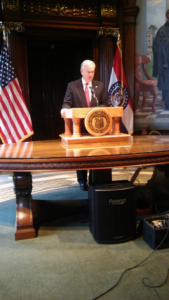Missouri Governor Jay Nixon (D) and House Speaker Pro Tem Denny Hoskins (R) disagree about language in a bill that Nixon vetoed.

Governor Jay Nixon addresses the Capitol Press Corps on September 7, 2016
Governor Nixon says that Hoskins’ bill would take away the legal right of consumers to obtain a refund if they cancel their extended vehicle warranty.
“Ask soon-to-be (State) Senator Hoskins, why he thinks consumers shouldn’t have the right to cancel extended warranty contracts,” Nixon tells Capitol reporters in Jefferson City.
But Hoskins says his bill says that whoever paid for the service contract should get the refund.
“There’s a misunderstanding on his (Governor Nixon’s) part and his office’s part about what the bill actually does. It does not prevent a consumer or purchaser of a vehicle from getting a refund should they cancel the warranty service contract on that vehicle,” Hoskins says.
Hoskins explains what he says the bill does.
“If you as a consumer buy an automobile and finance that automobile through a lending or a bank or a credit union, and you cancel the warranty contract that comes through that, if the bank paid for that warranty contract, then the refund should come back to them. If you as the purchaser of that vehicle bought the contract, then the refund should come back to you should you cancel that contract,” Hoskins says.
Hoskins will seek an override at Wednesday’s veto session in Jefferson City.
Governor Nixon wants lawmakers to sustain his veto. Nixon vetoed the bill this summer, citing the importance of consumer protection.
In his July 1 veto message, Nixon writes “Under current law, Missouri consumers are required to receive a full refund if they cancel the contract during the initial ‘free look’ period, which is 20 days from the time the contract is issued or mailed, provided that no claims have been made under the contract. House Bill No. 1976 would eliminate that requirement by allowing contract providers the option of crediting the account of a contract holder instead of paying the refund directly to the consumer. For consumers who have no other business with that contract provider, the credit would be unusable and therefore meaningless. Replacing the mandate to directly refund the money with the option of crediting an account is unnecesary, unfair to consumers, and contrary to the intent of the law it seeks to expand, which is to protect consumers from abusive practices by the motor vehicle extended service contract industry.”
An override requires a two-thirds vote in both chambers.

